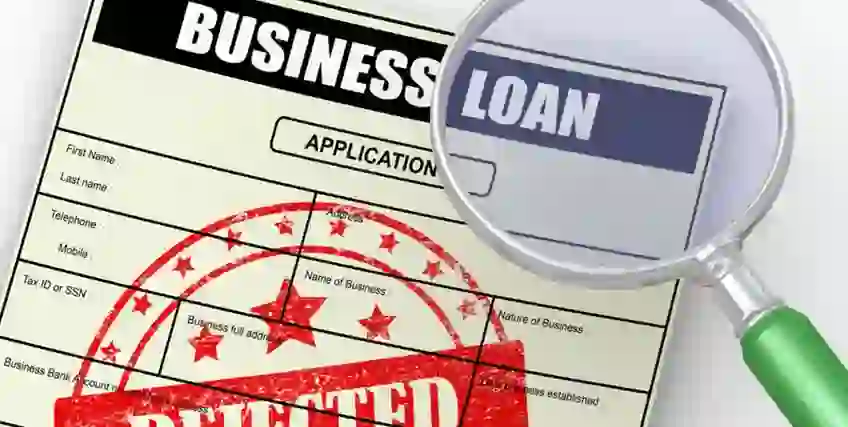What to Do If You Don’t Qualify for Business Lending: 5 Steps
September 20, 2025 | Last Updated on: September 20, 2025

Whether it’s due to limited credit history, inconsistent cash flow, or simply a tough economic climate, hearing “no” from a business lending representative can feel like a dead end. But fortunately, it’s not.
Rejection doesn’t mean your business can’t thrive — it just means it’s time to pivot and perhaps compare business loans. It could also mean that you should pause your application until you can get your business’s finances in better shape.
Below, we’ll explain the best ways to get a business loan if you’ve been denied.
Understand Why You Were Denied
If you skip this step and simply reapply with the same or a different business lending company, you might soon feel like you’re banging up against a brick wall. So, to start, review the initial lender's feedback or denial notice.
Common reasons for rejection include:
- Poor credit score: Minimum score requirements vary by loan type and lender. You might be able to qualify for a riskier instant small business loan or short-term loan with a lower personal credit score. (Strong personal credit can make up for not yet having a business credit history.)
- Too much debt: Perhaps you’re over-leveraged in the eyes of your preferred lender. It might be especially hard to dispel this notion if you have unpaid business tax debt (or worse, a tax lien) owed to the IRS.
- Not enough income: Like with debt-to-income ratio for consumer loans, business lending firms want to ensure you have the earnings or sales figures to afford your debt repayment. It’s common for firms to advertise their minimum monthly or annual revenue requirements for applying businesses.
- Lack of collateral: Maybe you applied without pledging the business’s liquid or material assets (or your own, via what’s known as a “personal guarantee”). Even if a lender doesn’t require collateral, including it can help you qualify (and for lower interest rates). Just be aware that the lender could seize the asset(s) if you fail to repay your debt.
Related: Are Small Business Loans Secured or Unsecured?
- Limited track record: Many lenders require that your business has been operating for a certain period — anywhere from six months to two years or longer — in order to qualify for funding.
- Ineligible industry: Banks, credit unions, and online companies limit their exposure, in part, by not lending to businesses in select industries, such as cannabis, pornography, and others.
- Incomplete documentation: If you applied a loan for your small business, you might have received requests to share or upload business records to support information you previously provided. Even if you met these minimum requirements, it’s possible your application was denied because you didn’t volunteer useful documents, such as a business plan.
Assess and Strengthen Your Finances
Now that you know what held your first business lending application back, it’s time to make it right. The solution might be straightforward. If you were declined because of a low credit score, for example, you can take steps to increase your score. You might zero your credit card balances and dispute credit report errors, to name a couple of examples.
While you’re at it, it can be helpful to conduct a financial health check, reviewing your business’s income, expenses, and cash flow. It’s possible that your maturing business now needs an accountant, or at least a consultant.
Other ways to set your business finances straight include:
- Build or update your business plan to include realistic financial projections.
- Establish an emergency fund or improve savings habits.
- Identify business (or personal) assets of value that you want to protect or, conversely, use as collateral.
Confirm You’re Applying for the Right Business Loan
If you’re dead-set on a particular loan for small businesses — whether it be a term loan, line of credit, or something else — skip ahead to step four. Otherwise, reconsider whether you’re applying for the financing option that’s both accessible and capable of helping you accomplish your goals.
Here are common types of business loans:
- SBA loans are guaranteed by the U.S. Small Business Administration and lent by approved business lending firms. They come in all shapes and sizes and are meant for borrowers who can’t get financing elsewhere.
- Microloans are similar to SBA loans because of their more accessible underwriting requirements, but they’re lent by community development financial institutions (CDFIs). Find a CDFI near you using the Opportunity Finance Network’s locator tool.
- Term loans offer lump-sum amounts and call for fixed, installment-style payments of the principal and interest.
- Lines of credit are advantageous if you have unpredictable (perhaps seasonal) funding needs, as you only repay (with interest) what you draw from your approved credit amount.
- Equipment financing are collateral loans by their very nature. The business equipment you finance serves as the collateral for the debt.
- Invoice financing is another form of a collateralized loan. A lender offers you an upfront, lump sum that equates to a percentage of your business’s unpaid invoices. Then you’d repay the debt as your invoices are paid. (Another loan type, invoice factoring works similarly, except that you sell the unpaid invoices to a third party that assumes collection efforts.)
- Merchant cash advances is similar to invoice financing, except that a business lending firm offers a loan in exchange for a percentage of your upcoming credit card sales. It may be a better fit if you operate a retail or other consumer-facing business.
Explore Alternative Lenders and Borrowing Options
Now that you have compared business loans, be sure you’re casting a wide net for the best possible lender.
Yes, if you’re seeking more flexible business loan eligibility criteria (and fast fund), an online lender may be the way to go. However, banks and credit unions could offer lower interest rates (perhaps including a loyalty discount if you already bank with them).
Fortunately, if you strike out on business lending from those traditional sources, you have other options:
- Peer-to-peer lending platforms can help you connect with individual investors who may take a particular interest in your business’s mission or goals.
- Family and friend loans could help you avoid or limit the typical loan cost of accruing interest. Just be mindful that not repaying the principal on this more informal debt could harm your personal relationship. (Also, this financing option won’t help you build personal or business credit.)
- Equity financing — or put more plainly, get a partner. By selling or sharing a portion of your ownership stake in the business, you could bring aboard a co-operator with stronger financials or experience. This could be a worthwhile route if you don’t have your own savings to tap.
- Crowdfunding platforms help you raise funds from strangers, perhaps motivating them with benefits in exchange for their donation-style contributions.
- Personal loans could be useful if you have strong credit (or a creditworthy co-applicant), but be aware that not all personal loans allow funding your business.
- Grants can be time-consuming to find and apply for, but once awarded, they typically don’t have to be repaid. While you’re at it, research local programs and resources, perhaps via the S. Economic Development Administration.
- Business credit cards have high APRs, but you can avoid them by zeroing your balance each month. These cards could also help you establish and improve your business’s credit.
Reapply with a Stronger Case
You figured out why your initial business lending application was declined. Then you went about addressing the root cause of the rejection. You even identified the right type of loan and lender for your financing needs. Now, it’s time to rebound.
Unless you were denied an SBA loan, you might get to work on your next application immediately. Consider these tips:
- Confirm your new application has covered up past weaknesses.
- Gather required documentation, such as financial statements, tax returns, and a solid business plan.
- Build relationships with lenders, including oft-overlooked local banks and credit unions.
- Consider working with a financial advisor or loan consultant.
FAQs about Small Business Loans
What disqualifies you from a small business loan?
Reasons for disqualification could include poor credit history, insufficient cash flow, or lack of a business plan.
How hard is it to get a small business loan?
Getting a small business loan can be challenging, especially for new businesses or those with limited credit history, inconsistent cash flow, or no collateral. Be wary of high-cost, perhaps short-term loans, that target ill-prepared startups.
What credit score is needed for a business loan?
Each lender requires a different business credit score to be approved. Additionally, some lenders may require the borrower to have their personal credit score as part of their lending requirements.
Why would a business not qualify for an SBA loan?
SBA loans aren’t available to outfits of certain sizes; non-profit businesses; and are less likely to lend to businesses that have defaulted on government-backed debt in the past or operate in speculative industries.
What if you’re rejected for business lending yet again?
Consider strategies to strengthen your business without a major capital investment. You could bootstrap your business by cutting unnecessary expenses and reinvesting profits. You might develop partnerships or barter services to save money. And you can explore ways to increase revenue with existing resources, such as by upselling or creating a new product line.
Frequent searches leading to this page
compare business loans, loans for small businesses, best way to get a business loan, instant small business loan




